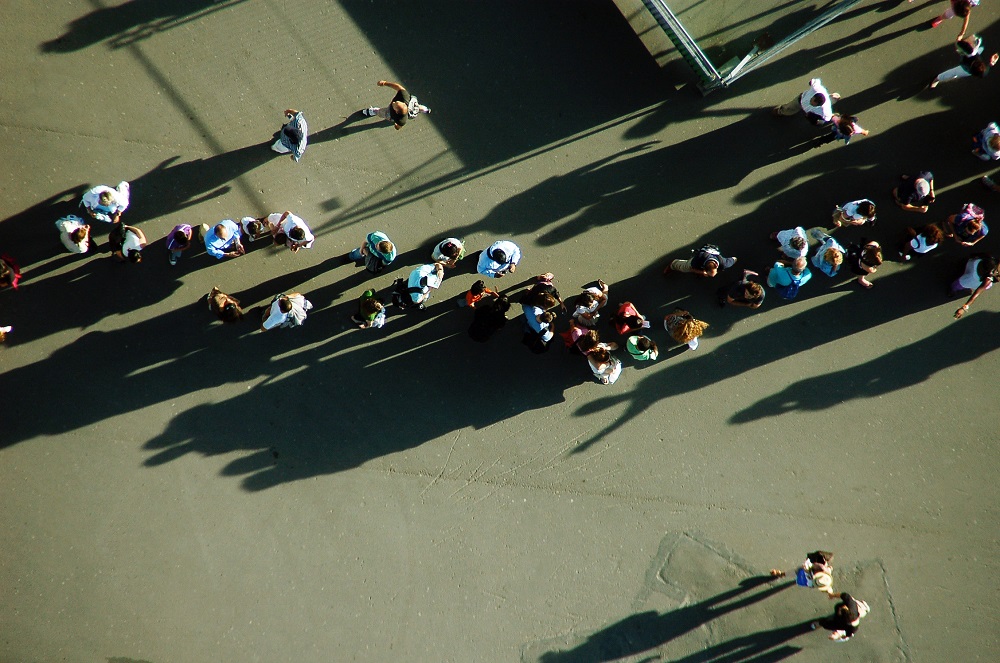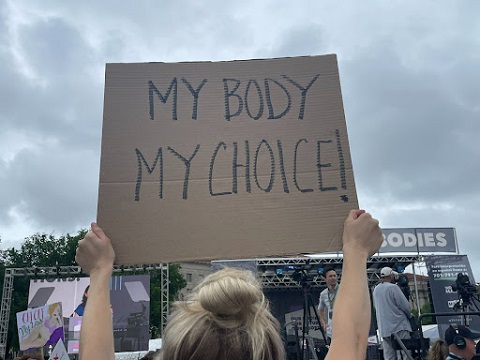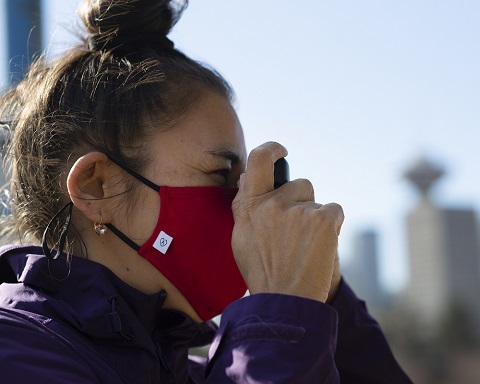By Helen Hill, Street Roots
Waiting in line sucks. We’ve all had to do it, and we will again. It’s exasperating and humbling, and it robs us of a precious, finite commodity: time.
But when you are living in poverty and in need of the basic tools of survival, such as food, shelter, health care and access to hygiene, the hours of a day lost to waiting in line can rise to a demoralizing, soul-crippling level.
I asked our vendors to talk about waiting in line early one Friday morning, while we were all waiting in line outside Street Roots for the lights to come on and the doors to open.
Vendor Erik Sweger commented: “That’s all we do. Being homeless, you have to wait in line constantly. You go for housing, you wait in line. To get a mat to sleep on, you wait in line. To get food, you wait – and not even for good food. We’re always being told to wait. We are spending a hell of a lot of time waiting in line. And because we’re homeless, we have a couple bags we’re carrying, so that makes it harder.
“It’s really frustrating,” Erik said. “You think, ‘I could be doing something else more productive’. Why is it taking so long? When I was growing up, they would show news clips about people waiting in line in Russia because of food shortages. Now it seems like that’s what we’re doing here. From what I hear, we’ve surpassed Russia; they don’t wait in line so much anymore. It’s getting like the Depression. I imagine we are nearly equal to what the lines during the Depression were like.”
Jennifer Bradford has a different perspective about waiting in lines from her wheelchair. After years of being housed, she had a stroke this past year, and four days later, her leg was amputated due to a blood clot. She speaks very slowly; her speech was affected by the stroke.
“You go for housing, you wait in line. To get a mat to sleep on, you wait in line. To get food, you wait – and not even for good food. We’re always being told to wait. We are spending a hell of a lot of time waiting in line. And because we’re homeless, we have a couple bags we’re carrying, so that makes it harder.”
“For me, it’s really hard because I used to walk everyplace and do everything for myself,” she said. “Now that I’m in a wheelchair, people kind of push past me and cut in front of me, and because I’m homeless, they think it’s OK. I wait for the MAX, and when it comes, I try to press the button, but they don’t open the door, and they take off. Every place I go, there’s always a line for something, and I have a hard time explaining, saying what I need.”
New vendor Gabriel Bradford is a young man experiencing homelessness for the first time. He’s been on the streets only a few months.
“I lost my ID, lost my job, lost everything. It just kind of led me here,” he said. “I used to have a lot of judgment about homeless people. Why aren’t they out there getting a job? They have all day. But what people don’t understand is how busy you actually are when you’re homeless. If you are an addict and want to stay clean, you need to go to a meeting. You need to be at a shelter at a certain time for a shower. You need to be at certain places to eat three meals a day. So you’re constantly busy and running around all day. It’s a challenge.
“It’s good for us to learn to be patient, waiting in line. It’s a spiritual journey. When we lose everything, we can focus on God instead of Netflix or our new couch. I feel more blessed homeless than I have ever with all my stuff. It was a challenge to look at it that way, especially when it was cold out. But if you can make it through that, you can make it through anything.”

Kerry Anderson put it very simply: “You stand in line to wait for everything. At the end of the line, you get nothing. If you are trying to pursue something, it takes up most of the day,” he said.
“You can go to the Red Door and get free clothes and free food, but that’s a long line you have to get in to wait,” Billy Turner said. “I can stand at my corner for that hour and sell papers.”
For Magpie Blue, waiting in line is a physical challenge, as well as a mental one.
“I don’t do well physically standing for long periods of time,” she said. “Waiting in line is time consuming. Waiting for a bathroom is No. 1. Food is No. 2. And I do a lot of waiting for the streetcar, for MAX.” Magpie estimates she spends 20 per cent to 30 per cent of each day waiting in line.
Leah Filar has wanted to write a poem for some time about waiting in line.
“You know the song ‘Signs, signs, everywhere a sign’? Well, I want to write a poem that goes ‘Lines, lines, everywhere a line.’ When you are homeless, it’s double the lines,” she said. “You get up in the morning and stand in a line to use the bathroom, and you get five minutes, usually two minutes until someone starts banging on the door. If you’re lucky, you get to pee and brush your teeth. You have to get in line to sign up for a shower. Then you have to show back up and wait in another line to get in the shower. Then you’ve got 15 minutes to shit, shower and shave. Then you have to get in another line if you want clean clothes to wear. And then mealtime, and a lot of times these feeds, the lines are around the corner. Blocks long. When they open up new Section 8 housing, people camp out and wait through the night.”
“You stand in line to wait for everything. At the end of the line, you get nothing. If you are trying to pursue something, it takes up most of the day.”
Raven Thickett spoke of the unending focus needed to get through her days.
“Housing, food, showers – you have to pick one, and that’s all you’ll be able to do that day because of the long lines. What goes through my head is the fact that I’m not getting anywhere. In order to get out of the homeless position, you have to have all your ducks in a row, everything together. You technically can only take care of one task at a time.
“I’ve been stuck in this predicament because of that. It’s like a merry-go-round with nothing merry about it,” Raven said.
“The wait for a typical food bank is an hour or two hours to get basic pantry food,” vendor Lori Lematta said. “Waiting for buses, looking for housing, waiting for your doctor. I have appointments all week long to get better, but you’re just worn out chasing survival. That’s what it feels like.”




















